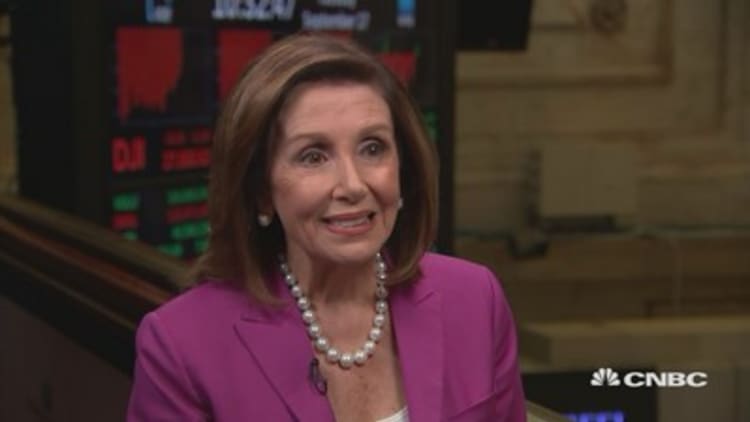House Speaker Nancy Pelsoi unveiled a sweeping plan Thursday to lower the price of prescription drugs.
She and fellow House Democratic leaders have been working for months on a plan to reduce U.S. drug prices. The main thrust of the plan will allow Medicare to negotiate lower prices on as many as 250 of the most expensive drugs, including insulin, per year and apply those discounts to private health plans across the U.S, according to a legislative summary distributed to lawmakers.
The plan will also establish an international pricing index that is supposed to bring drug prices in line with what other nations pay and penalize pharmaceuticals companies that refuse to negotiate with the government or fail to reach any drug pricing agreement. The penalty will start at 65% of the gross sales of the drug in question and increase by 10% each quarter the manufacturer doesn't reach an agreement, according to the summary.
Pelosi's proposal also will:
- penalize pharmaceutical companies that raise the price of their drugs faster than inflation
- create an out-of-pocket maximum of $2,000 for Medicare beneficiaries
- and reinvest savings from negotiated prices on finding new treatments at NIH.
Pelosi and other House leaders discussed the proposal at a press conference in Washington later Thursday.
"The status quo on prescription drug prices is broken," House leaders say in the summary. "Prescription drug companies are charging Americans prices that are three, four, or even ten times higher than what they charge for the same drugs in other countries."
The Pharmaceutical Research and Manufacturers of America, called PhRMA, the industry's main trade group, opposed the plan, saying it gives "the federal government unprecedented, sweeping authority to set medicine prices in public and private markets while importing price controls from other countries that restrict access to innovative medicines."
"Speaker Pelosi's radical plan would end the current market-based system that has made the United States the global leader in developing innovative, lifesaving treatments and cures," PhRMA President and CEO Stephen J. Ubl said in a statement.
Current rules prohibit the Department of Health and Human Services from negotiating drug prices on behalf of Medicare — the federal government's health insurance plan for the elderly. Private insurers use pharmacy benefit managers to negotiate drug rebates from pharmaceutical manufacturers in exchange for better coverage. The rebates often get paid to the PBMs or insurance companies, although insurers say consumers benefit from lower copays and premiums.
High prescription drug costs have become a rare bipartisan issue, with lawmakers on both sides of the aisle demanding changes. Congress and the Trump administration are trying to pass legislation before the end of the year that would bring more transparency to health-care costs and, ultimately, lower costs for consumers.
Pelosi's plan, which has been described as left-leaning, is likely to get pushback among Republicans who say they want prices negotiated in a free market.
"In this case, there is a monopoly and the government needs to intervene," said Gerard Anderson, professor of health policy and management at Johns Hopkins University. "Setting the maximum price at an international standard and then negotiating is a sensible approach".
Another plan, from the Senate Finance Committee and backed by President Donald Trump, would also make changes to Medicare and include a penalty for pharmaceutical companies that raise drug prices faster than inflation. The plan, which lawmakers see as a "middle ground" approach to drug prices, received pushback from Republicans who argued the penalty rule was an excessive government intervention.
The legislation is expected to move through House committees to a vote on the floor.
Pharmaceutical giants Pfizer, Merck and Eli Lilly were all up about 1% in midmorning trading Thursday. The SPDR S&P Pharmaceuticals index, which tracks drug stocks, was up less than 1%.
Watch: House Speaker Nancy Pelosi: Improve Obamacare, no need to reinvent health care



